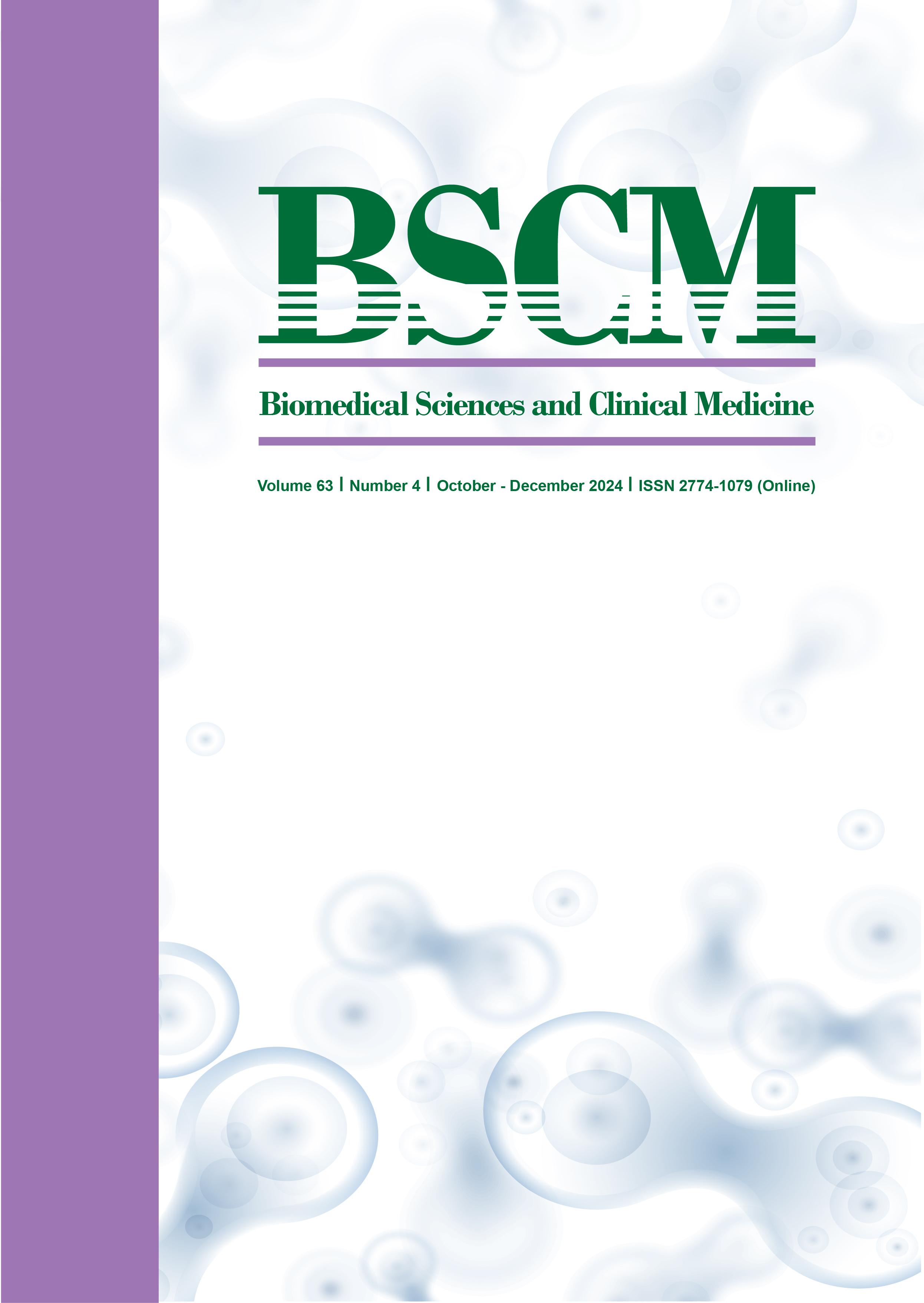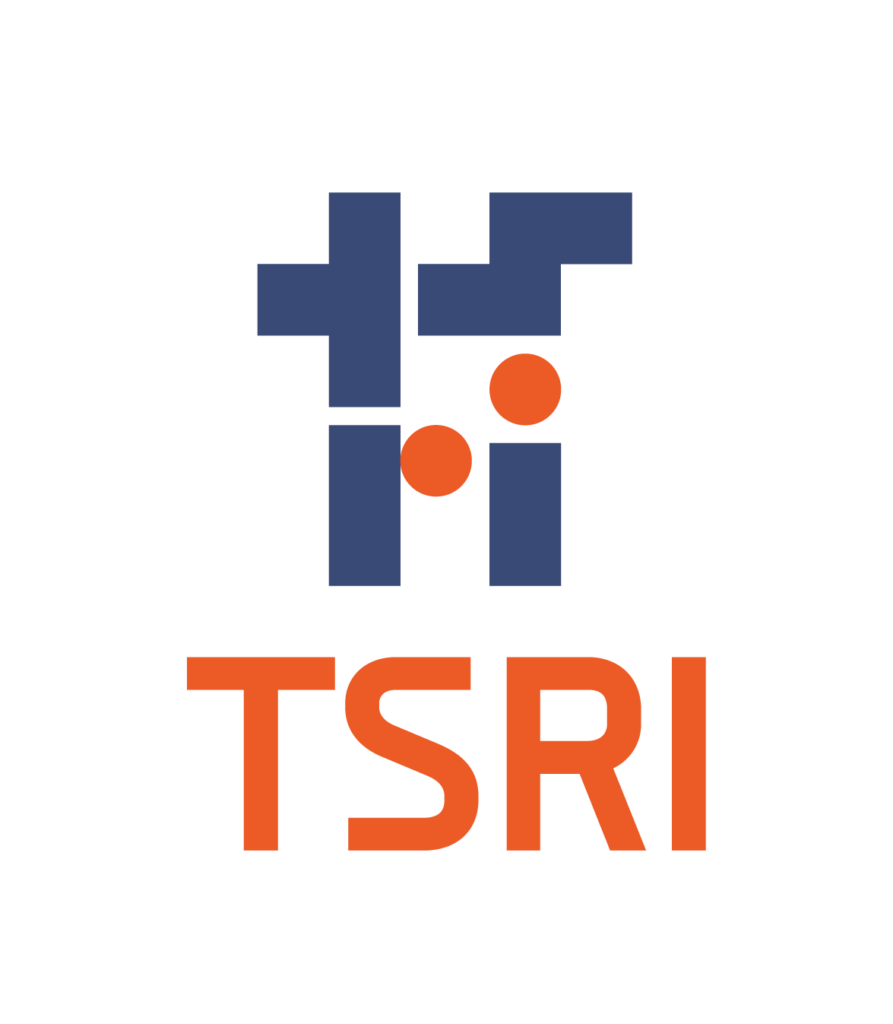Frequency of EGFR mutations and associated clinical factors in Thai patients with non-small cell lung cancer (NSCLC)
คำสำคัญ:
epidermal growth factor receptor, EGFR, non-small cell lung cancer, NSCLC, Thai, clinical factorsบทคัดย่อ
Objective Understanding clinical factors related to epidermal growth factor receptor (EGFR) mutation in lung cancer patients is imperative for effective treatment planning. It is also crucial to recognize ethnic differences. Hence, studying the prevalence and types of EGFR mutations in Thai patients with non-small cell lung cancer (NSCLC) is essential. Investigating clinical factors influencing EGFR mutation detection remains critical.
Methods Etiognostic research with a retrospective observational cohort design collected clinical data from NSCLC patients undergoing EGFR molecu-lar testing using real-time PCR from November 1, 2017 to September 30, 2022. The relationship between smoking as well as other clinical factors of interest and the detection of EGFR mutation through regression were analyzed.
Results The EGFR mutation rate was 46.55%, with 108 cases detected out of 232 patients. EGFR mutation was detected in 63.41% of the never smoking group. Exon 19 deletion (51.85%) and exon 21 L858R mutation (36.11%) were the predominant types. Univariable regression analysis identified factors correlated with EGFR mutation detection, including female gender, non-smoker status, adenocarcinoma lung cancer type, and bone metastasis. A statistically significant reduction in EGFR mutation detection was observed in patients with squamous cell carcinoma lung cancer. Multivariable regression analysis confirmed non-smoker and adenocarcinoma lung cancer type as significant independent predictors of EGFR mutation detection (adjusted OR 2.84, 95%CI 1.20-6.74, p = 0.018) (adjusted OR 14.39, 95%CI 1.77-116.84, p = 0.013), respectively. The survival analysis results showed significant survival differences between stage 4 NSCLC patients with EGFR mutations and EGFR wild-type (median overall survival: 22.98 months vs 8.72 months, median survival time difference: 12.60 months, p < 0.001).
Conclusions Adenocarcinoma and non-smoker status represent significant factors associated with EGFR mutation. Nonetheless, performing an EGFR test before initiating treatment remains crucial as it enhances treatment precision and specificity.
เอกสารอ้างอิง
Fois SS, Paliogiannis P, Zinellu A, Fois AG, Cossu A, Palmieri G. Molecular epidemiology of the main druggable genetic alterations in non-small cell lung cancer. Int J Mol Sci. 2021;22:612. PubMed PMID: 33435440
Bethune G, Bethune D, Ridgway N, Xu Z. Epidermal growth factor receptor (EGFR) in lung cancer: an overview and update. J Thorac Dis. 2010;2:48-51.
Roskoski R, Jr. The ErbB/HER family of protein-tyrosine kinases and cancer. Pharmacol Res. 2014;79:34-74.
Gejman R, González S, Muñoz-Medel M, Nervi B, Sánchez C, Ibáñez C, et al. Prevalence of EGFR mutations and clinico-pathological characteristics of chilean lung cancer patients. Asian Pac J Cancer Prev. 2019;20:1-4.
Melosky B, Kambartel K, Häntschel M, Bennetts M, Nickens DJ, Brinkmann J, et al. Worldwide prevalence of epidermal growth factor receptor mutations in non-small cell lung cancer: a meta-analysis. Mol Diagn Ther. 2022;26:7-18.
Jurišić V, Obradovic J, Pavlović S, Djordjevic N. Epidermal growth factor receptor gene in non-small-cell lung cancer: the importance of promoter polymorphism investigation. Anal Cell Pathol (Amst). 2018;2018:6192187. PubMed PMID: 30406002
Araki T, Kanda S, Horinouchi H, Ohe Y. Current treatment strategies for EGFR-mutated non-small cell lung cancer: from first line to beyond osimertinib resistance. Jpn J Clin Oncol. 2023;53:547-61.
Zhou W, Christiani DC. East meets West: ethnic differences in epidemiology and clinical behaviors of lung cancer between East Asians and Caucasians. Chin J Cancer. 2011;30:287-92.
Izumi M, Suzumura T, Ogawa K, Matsumoto Y, Sawa K, Yoshimoto N, et al. Differences in molecular epidemiology of lung cancer among ethnicities (Asian vs. Caucasian). J Thorac Dis. 2020;12:3776-84.
Saiyaros K, Kritpetcharat P, Pairojkul C, Sithithaworn J. Detection of epidermal growth factor receptor (EGFR) gene mutation in formalin fixed paraffin embedded tissue by polymerase chain reaction-single strand conformational polymorphism (PCR-SSCP) in non-small cell lung cancer in the Northeastern Region of Thailand. Asian Pac J Cancer Prev. 2019;20:1339-43.
Sriuranpong V, Chantranuwat C, Huapai N, Chalermchai T, Leungtaweeboon K, Lertsanguansinchai P, et al. High frequency of mutation of epidermal growth factor receptor in lung adenocarcinoma in Thailand. Cancer Lett. 2006;239:292-7.
Ha SY, Choi SJ, Cho JH, Choi HJ, Lee J, Jung K, et al. Lung cancer in never-smoker Asian females is driven by oncogenic mutations, most often involving EGFR. Oncotarget. 2015;6:5465-74.
Gaur P, Bhattacharya S, Kant S, Kushwaha RAS, Singh G, Pandey S. EGFR mutation detection and its association with clinicopathological characters of lung cancer patients. World J Oncol. 2018;9:151-5.
Shigematsu H, Lin L, Takahashi T, Nomura M, Suzuki M, Wistuba, II, et al. Clinical and biological features associated with epidermal growth factor receptor gene mutations in lung cancers. J Natl Cancer Inst. 2005;97:339-46.
Zhang YL, Yuan JQ, Wang KF, Fu XH, Han XR, Threapleton D, et al. The prevalence of EGFR mutation in patients with non-small cell lung cancer: a systematic review and meta-analysis. Oncotarget. 2016;7:78985-93.
He Q, Zhang M, Zhang J, Chen Y, He J, Shen J, et al. Correlation between epidermal growth factor receptor mutations and nuclear expression of female hormone receptors in non-small cell lung cancer: a meta-analysis. J Thorac Dis. 2015;7:1588-94.
Márquez-Garbán DC, Chen HW, Fishbein MC, Goodglick L, Pietras RJ. Estrogen receptor signaling pathways in human non-small cell lung cancer. Steroids. 2007;72:135-43.
Sui Q, Liang J, Hu Z, Chen Z, Bi G, Huang Y, et al. Genetic and microenvironmental differences in non-smoking lung adenocarcinoma patients compared with smoking patients. Transl Lung Cancer Res. 2020;9:1407-21.
Kuśnierczyk P. Genetic differences between smokers and never-smokers with lung cancer. Front Immunol. 2023;14:1063716.
Wang Z, Seow WJ, Shiraishi K, Hsiung CA, Matsuo K, Liu J, et al. Meta-analysis of genome-wide association studies identifies multiple lung cancer susceptibility loci in never-smoking Asian women. Hum Mol Genet. 2016;25:620-9.
Wang R, Wang G, Ricard MJ, Ferris B, Strulovici-Barel Y, Salit J, et al. Smoking-induced upregulation of AKR1B10 expression in the airway epithelium of healthy individuals. Chest. 2010;138:1402-10.
Cubillos-Angulo JM, Fukutani ER, Cruz LAB, Arriaga MB, Lima JV, Andrade BB, et al. Systems biology analysis of publicly available transcriptomic data reveals a critical link between AKR1B10 gene expression, smoking and occurrence of lung cancer. PLoS One. 2020;15:e0222552. PubMed PMID: 32097409
Fukumoto S, Yamauchi N, Moriguchi H, Hippo Y, Watanabe A, Shibahara J, et al. Overexpression of the aldo-keto reductase family protein AKR1B10 is highly correlated with smokers’ non-small cell lung carcinomas. Clin Cancer Res. 2005;11:1776-85.
Tseng CH, Chiang CJ, Tseng JS, Yang TY, Hsu KH, Chen KC, et al. EGFR mutation, smoking, and gender in advanced lung adenocarcinoma. Oncotarget. 2017;8(58):98384-93.
Zhang X, Guo X, Gao Q, Zhang J, Zheng J, Zhao G, et al. Association between cigarette smoking history, metabolic phenotypes, and EGFR mutation status in patients with non-small cell lung cancer. J Thorac Dis. 2023;15:5689-99.











